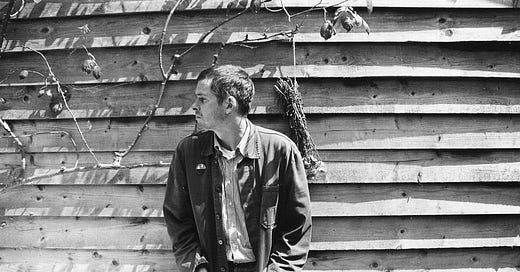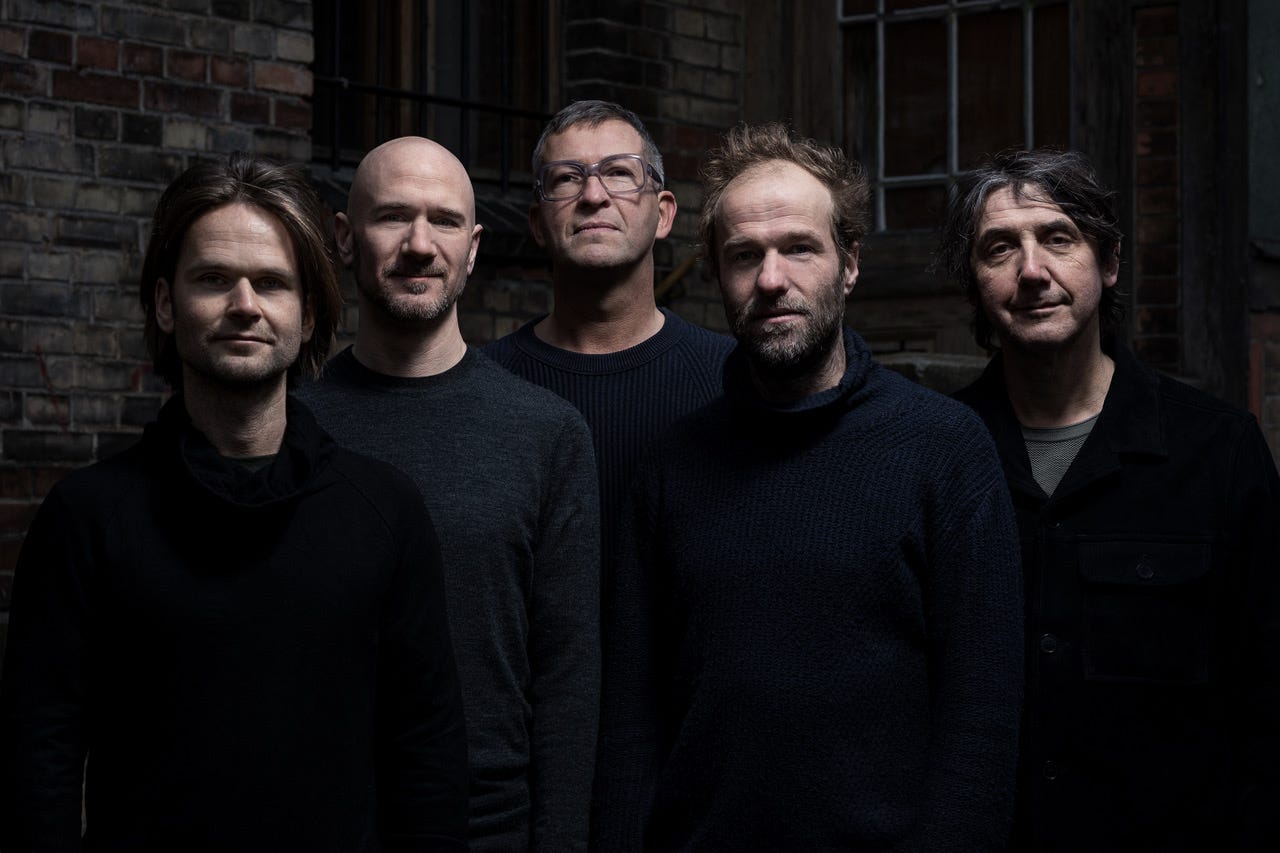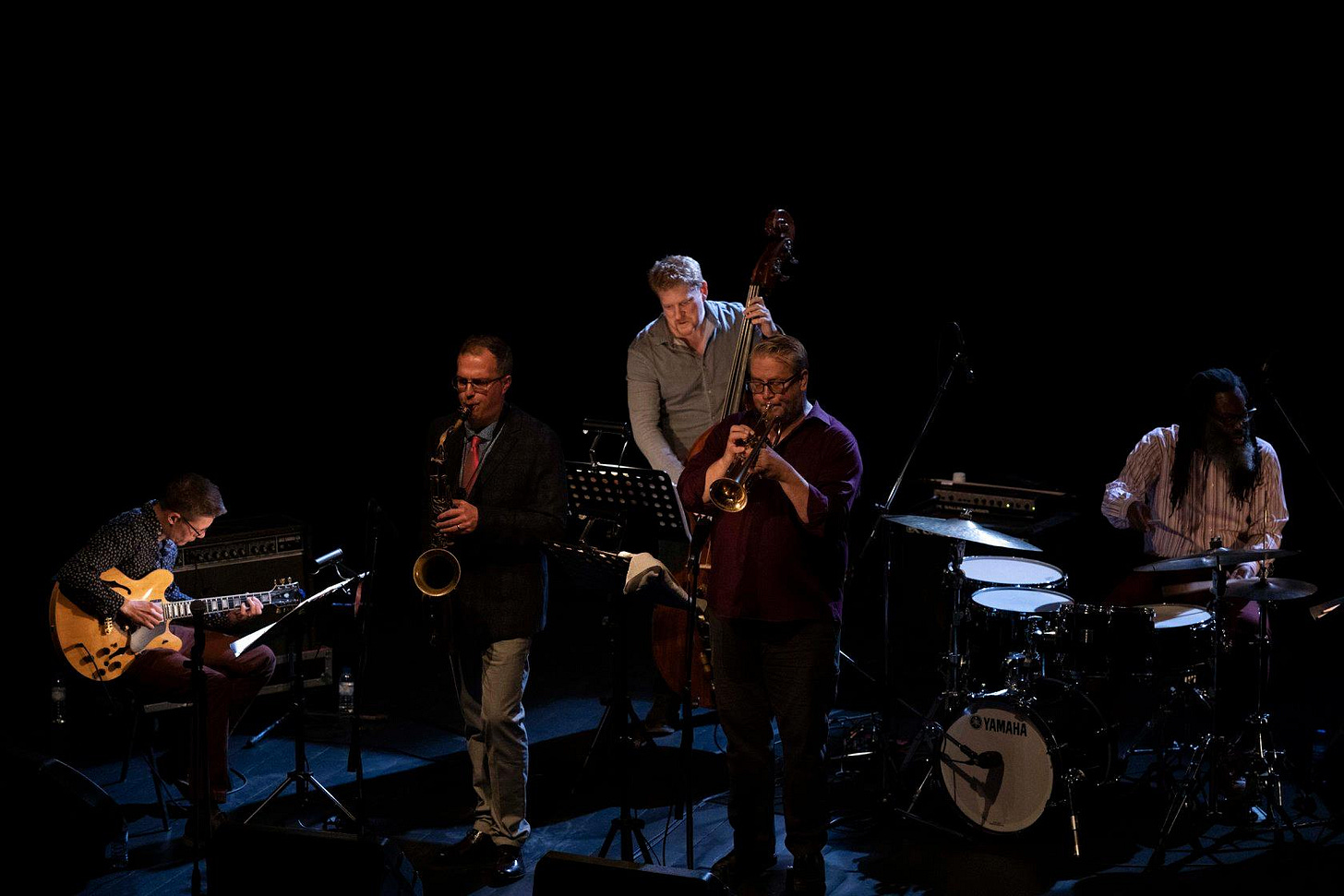I’m on a train back to Berlin from Donaueschingen Musiktage 2023, where I’ve been taking in some heady sounds for a forthcoming review in the Wire, so this week’s newsletter is a bit more brief than unusual. It might happen again next week, but let’s see. Thanks for reading!
Modern Nature Hits its Stride With Measured Grace
When I first heard British singer and songwriter Jack Cooper as a member of Ultimate Painting and, soon after, as a burgeoning solo artist, starting around 2015, I couldn’t have imagined seeing him work with some of England’s best free improvisers and contemporary music practitioners within a decade. From the start he wed his amiable, scrappy post-Velvets melodies with a homemade, highly personal vibe, qualities that have endured in his work, despite its sharp stylistic turn. A few years ago he released Tributaries (Astral Spirits), an instrumental duo album by the guitarist with reedist Jeff Tobias of the Sunwatchers that presented a pair of side-long pieces, devising a loose compositional framework much closer to new music that pop, with admirable interplay and restrained pacing. It made clear that Cooper was developing, growing a bit tired with the fixity of pop forms while still embracing a certain concision and structure. You can hear the album’s first piece, “Wicken,” below.
Earlier this year the same label released Arrival, a minimalist gem performed by the brilliant improvising pianist Alexander Hawkins with cellist Anton Lukoszevieze and clarinetist Heather Roche, both of the superb new music ensemble Apartment House. The stripped-down music owes a heavy debt to the post-Cagean aesthetics of the Wandelweiser Collective while retaining a clear ardor for melody, however stretched out and elliptical it may be. Cooper recorded the record with an endearing homemade vibe, where every grain of the instruments is palpable and the vibe of the room shines through, preserving a sensibility from his indie rock roots in a completely different context. You can check out an excerpt from the piece below.
Since Ultimate Painting split up in 2018, Cooper’s main outlet as been Modern Nature, a kind of open-ended pop band with a revolving cast of collaborators complementing a core of Cooper, Tobias, and drummer Jim Wallis. All of the group’s recordings have been stunning, bringing fragile, perpetually mutable arrangements to his delicate pop tunes, where folk-rock structures are extended and pushed by imaginative improvisers. The group really connected for me with its early 2022 album Island of Noise (Bella Union), where the trio was complemented by pianist Hawkins, violinist Alison Cotton, bassist John Edwards, and saxophonist Evan Parker, all of whom committed themselves to realizing Cooper’s ideas, operating with exquisite restraint and ensemble-oriented collectivity. Suddenly, the songs exhibited increased elasticity, heightened delicacy, and delicious tension in the way the performances seemed to breathe, with each contributor given a certain agency that pressed against the strictures of the tunes.
Late last month Modern Nature returned with No Fixed Point in Space (Bella Union), its best, most hushed transmission yet. Cooper brought in a new, even larger group of collaborators to interpret his elegantly measured arrangements, with Lukoszevieze, Roche and violinist Mira Benjamin (a fellow Apartment House mainstay) now joined by Necks keyboardist Chris Abrahams, clarinetist Alex Ward, bassist Dominic Lash, and singer Julie Tippetts. Tobias and Wallis remain the group’s core. Most of the reviews I’ve seen have referenced late Talk Talk and Mark Hollis, particularly in the rhythmically hypnotic vibe, but Cooper has his own thing going on. His singing is far more homemade and naturalistic than the emotive extremes of Hollis and the arrangements are more translucent and aerated. Cooper has said “I wanted the music to reflect nature: beginnings and endings, arrivals and departures, process and chance. I wanted the music and the words to feel like roots, branches, mycelium, the intricacies of a dawn chorus, neurons firing, the unknown.”
While I find that description a bit fanciful, its essential concept is audible in the music. There’s a deeply organic vibe to the performances, translating that lived-in feel present in the trio piece Arrival to an art-pop band. On previous albums Wallis made use of his full drum kit, but here he sticks mostly to gentle cymbal patterns that might feel metronomic in their minimalist obstinacy, but the chatter accelerates and decelerates regularly, as if running briskly and then slowing down, repeating the rise-and-fall ad infinitum. On “Orange” the percussion is reduced to a kind of soft, rolling clatter that sounds like a string of shells, dispensing with any fixed pattern altogether, although Lash deftly holds down the center. The excellent band feels simultaneously locked-in and incredibly loose, following Cooper’s gentle warble—which I find much closer to Robert Wyatt or Nick Drake than Hollis. Below you can check out of the album’s most beautiful pieces, “Murmuration,” where damped piano figures sound more like a hammer dulcimer with most of its strings missing than a keyboard, and Cooper's voice is expertly shaded by the vibrato-heavy warble of Tippetts.
The listener has to meet the music halfway, leaning as if playing a Morton Feldman recording at moderate volume and struggling to hear each nuance. But it’s worth the effort, as the majesty of Cooper’s tunes requires us to mentally complete every insinuation or fill in blanks. Cooper doesn’t possess an especially strong voice, but he knows how to get the best out of his instrument, especially when he overdubs vocal harmonies, which also imply rather than declare. He co-wrote the song “Tapestry” with Sarah Hennies, another experimental artist with deep indie rock roots, and it’s the most experimental thing here, with Lash’s bass and the drumming of Wallis laying out a stuttering canter for the see-saw reeds and wordless vocal harmonies by Tippetts, patiently coalescing into a multivalent pop gem that never relinquishes its exquisite anxiety. No Fixed Point in Space is one of the most stunning albums of the year, its stylistic slipperiness only enhancing its ineffable beauty.
Meinrad Kneer’s Brawny, Thrumming Post-Bop
Bassist Meinrad Kneer is one of those ubiquitous local figures, maintaining such a steady presence that it can be easy to take him for granted. I know him best for the collective trio’s he’s had with drummer Bill Elgart, who played on some of Paul Bley’s best records, and Dutch reedist Ab Baars—Kneer studied in Amsterdam and spent most of his time there until returning to Germany a little over a decade ago—but after four years in Berlin I’ve see his name in all kinds of disparate contexts, surfacing in many ad hoc contexts as well as a recurring role as sideman in numerous other groups, including pianist Julie Sassoon’s Quartet and an ongoing Dutch combo, Bite the Gnatze. He recently released Der Zweite Streich (Jazzwerkstatt), the second album by his long-running quintet, and the band will give one of its sporadic performances on Thursday, October 26, with a free show at the Musikinstrumenten-Museum.
In his press materials the bassist explains that he wanted the band to explore a nexus between “jazz, improv, ethnic music, new music and rock,” which isn’t especially helpful, since that all counts as a sizable chunk of available options. While drummer Andreas Pichler does often lay down a propulsive backbeat, this is a post-bop band, take it or leave it. That’s not a bad thing, and I like the new album as much as anything I’ve heard from Kneer. The arrangements invite his bandmates to attack his muscular themes with gusto, perpetually pushing against the seams with often garrulous interplay. I’d never previously heard trumpeter Sebastian Piskorz before, but I have encountered the versatile playing of both alto saxophonist Peter Van Huffel and trombonist Gerhard Gschlößl in plenty of disparate contexts. While they’re not reinventing the wheel in this quintet, the assured interplay and raucous improvisations indicate a real connection among the players, who manage to engage in fat-toned crosstalk without tripping one another up. It’s a great kind of chaos, with all the voices having a blast together.
On a mid-tempo creeper like “Ferner,” a hefty groove is presided over by chorale-like lines by the horns, rhapsodizing in loose consort, while on something like “1986” there’s a slashing ferocity to the frontline that hints at a lurching, narcotic take on Balkan brass music. The horns rarely sit out; when one horn takes a solo the other two are offering encouragement and burly asides, tracing the score with gutsy accents. On “As Close As It Gets,” which you can check out below, the horns seem like they’re chasing one another in a kind of parallel back-and-forth, until they come together in the final seconds blurting a lick that sounds purloined from “Salt Peanuts.” It’s nice to hear a band that refused to be polite while cleaving to tradition.
Russ Johnson Chronicles
Last month I wrote about an excellent new quartet album from trumpeter Russ Johnson, a veteran improviser based in Milwaukee who seamlessly straddles post-bop and free contexts. Those who know his music appreciate his versatility, soulfulness, and experimental impulses, but too many people aren’t aware of his talents. So I’m continuing to shed some light on his work with this little recurring feature. Although Reveal might be the only album released under his own name this year, he appears as a valuable sideman on many more, including Quaver (Calligram), a terrific quintet outing by reedist Geof Bradfield, a Chicago treasure who’s probably taken for granted as much as Johnson. I lived in Chicago for 35 years, so I have a clear bias about the city’s dynamic jazz and improvised music scene, but since moving away five years ago I’ve regularly observed how often its deep scene is overlooked. I first heard Bradfield more than two decades ago as part of a great trio with drummer Ted Sirota and bassist Noel Kupersmith, an agile group that was part of the same community of musicians as cornetist Rob Mazurek, who worked with all three of them in various contexts.
Bradfield is something of a traditionalist, deeply conversant in the music’s history, but also seriously curious, perpetually trying out new compositional concepts and different instrumental combinations. His sublime 2020 trio album General Semantics (Delmark) with clarinetist Ben Goldberg and drummer Dana Hall captures him at his most adventurous, while other projects, like the nonet that made his 2018 album Yes and…Music for Nine Improvisers (Delmark) showcased his deft arranging skills. Most of Quiver was recorded live at Chicago’s Green Mill in October of 2021—the venue’s long-time owner Dave Jemillo can be heard introducing the band in his instantly recognizable Midwestern drawl—with three additional tunes cut around the same time at Pro Musica, the Chicago audio shop co-owned by engineer Ken Christianson. The top-notch band—with Johnson, drummer Hall, bassist Clark Sommers, and guitarist Scott Hesse—embraces a classic Chicago aesthetic, spiked with the blues, unfussy in its attack and arrangements, and wide-ranging in the leader’s compositions.
Johnson gets the first solo on the album, showcasing his mastery of plunger mute on the groovy “Deep Ellum,” a soul jazz gem that salutes the jazz and blues scene of Dallas—Bradfield was born and raised in Houston—with Hesse laying down a taut, cycling figure that simulates something a Hammond B-3 player might comp with. As they do across the entire album, Sommers and Hall carve out the sort of rhythmic attack that distinguishes so much Chicago music, where the blues is never out of earshot. They know how to create an irresistible pocket, and that gives the frontline plenty to work with beyond the leader’s sophisticated writing. Bradfield’s tenor solo is just as satisfying as the trumpet feature, seamlessly blending harmonic exploration with elastic phrasing. The title track is sublime, an effortless time-shifting endeavor that underlines the rapport Bradfield has honed with the rhythm section over the years—the same musicians work together in Sommers’ gritty trio Ba(SH). Bradfield’s steeplechase solo is thrilling, an endless series of ascending and descending figures loaded with potent asides that would surely collapse in less assured hands. Johnson’s solo is no less impressive, tracing the changes with lapidary precision and breathless agility. There’s a bossa feel behind the elegantly proportioned ballad “Não Faz Mal,” where Hall’s minimalist playing makes the performance seem to levitate. “Plucky,” which you can hear below, not only has a title that seems Monk-ish, but its stuttering, blocky melodic sensibility also summons the spirit of the pianist.
Recommended Berlin Shows This Week
October 24: Joseph Houston (Bryn Harrison, Chiyoko Slavnics, Linda Catlin Smith, Max Murray, Cassandra Miller, Joseph Houston), 8 PM, BKA Theater, Mehringdamm 34, 10961 Berlin
October 24: Contagious (Andrea Neumann, Sabine Ercklentz & Mieko Suzuki) with Valentina Magaletti, 8 PM, Morphine Raum, Köpenicker Straße 147, 10997 Berlin (Hinterhof 1. Etage)
October 25: The Pitch with Jules Reidy, 8 PM, KM28, Karl-Marx-Straße 28, 12043 Berlin
October 25: Brìghde Chaimbeul, 8 PM, Kuppelhalle , Silent Green, Courtstrasse 35, 13347 Berlin
October 25: Teenage Fanclub; Sweet Baboo, 8 PM, Heimathafen Neukölln, Karl-Marx-Straße 141 in 12043
October 26: Meinrad Kneer Quintet, 7 PM, Musikinstrumenten-Museum, Tiergartenstrasse 1, 10785 Berlin (Curt Sachs Hall)
October 27: Max Eastley, Axel Dörner & Nicola L. Hein, 8:30 PM, Zwitchermaschine,
Potsdamer Straße 161, 10783 Berlin
October 28: Achim Kaufmann, Nick Dunston, and Mariá Portugal, 3:30 PM, Industriesalon Schöneweide, Reinbeckstraße 10, 12459 Berlin
October 28: Harmonic Space Orchestra plays works by Marc Sabat, Thomas Nicholson, and Catherine Lamb, 8 PM, KM28, Karl-Marx-Straße 28, 12043 Berlin
October 29: Boulez Ensemble with François Xavier Roth (Debussy, Manoury), 4 PM, Pierre Boulez Saal, Französische Straße 33d, 10117 Berlin
October 30: Wolf Eyes, 8 PM, Kuppelhalle , Silent Green, Courtstrasse 35, 13347 Berlin






